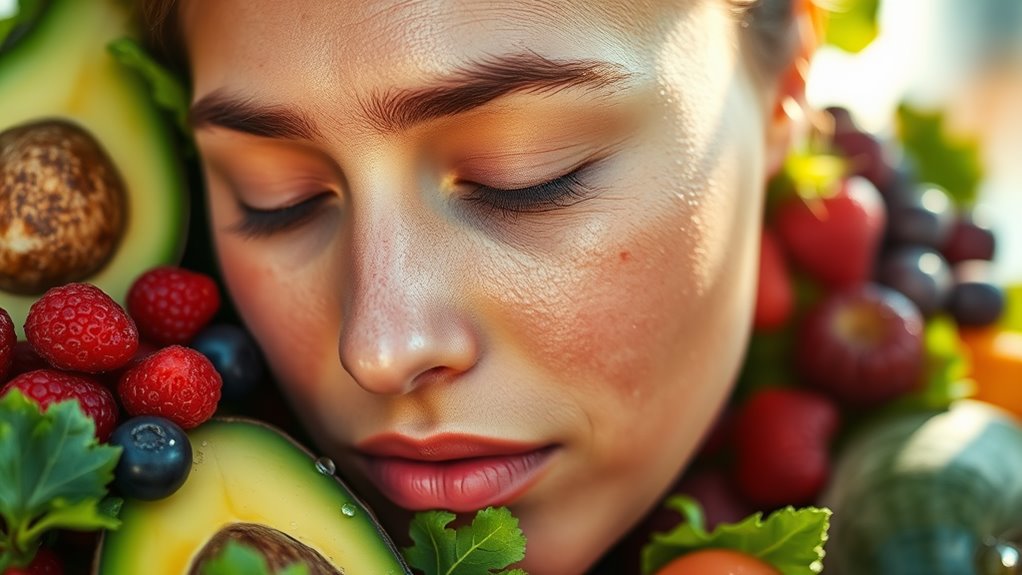Skin Troubles. These Nutrition Tips Might Help
If you’re facing skin troubles, changing your diet can make a significant difference. Incorporate antioxidant-rich foods like berries and green tea to combat damage. Focus on low glycemic index foods to reduce acne and inflammation. Essential vitamins A, C, and E boost collagen and protect your skin. Don’t forget healthy fats from sources like salmon for hydration. A balanced diet supports gut health, which is key for clear skin. More tips await to help you transform your skin!
Key Takeaways
- Incorporate low glycemic index foods like berries and whole grains to stabilize blood sugar and reduce acne severity.
- Focus on antioxidant-rich foods such as blueberries and green tea to combat oxidative stress and improve skin health.
- Ensure adequate hydration by drinking at least 8 cups of water daily to maintain skin elasticity and hydration.
- Include fiber-rich foods to support gut health, which is essential for reducing inflammation and improving skin conditions.
- Prioritize vitamins A, C, and E from whole foods like sweet potatoes and nuts to enhance collagen production and protect the skin.
The Role of Antioxidants in Skin Health
Antioxidants play a crucial role in maintaining skin health by protecting it from damage caused by free radicals. You can achieve clear skin through food by incorporating antioxidant-rich options into your diet.
Foods like blueberries, green tea, and salmon are packed with vitamins and omega-3 fatty acids that reduce inflammation and enhance hydration. They boost collagen production, which helps improve skin elasticity and reduce fine lines. Additionally, antioxidants help combat oxidative stress, which can lead to premature ageing of the skin. Consuming nutrient-rich foods regularly can further enhance your skin’s resilience and vitality.
Leafy greens not only provide important vitamins but also support your skin’s overall appearance. By making these dietary changes, you’ll not only nourish your skin but also defend it against environmental stressors.
Embrace these delicious foods, and watch your skin glow with liveliness and health!
Understanding the Impact of Diet on Acne
When it comes to managing acne, focusing on low glycemic index (GI) foods can make a real difference. These foods help stabilize your blood sugar levels and may reduce inflammation, leading to clearer skin. Additionally, a fiber-rich diet supports gut health, which plays an essential role in your overall skin condition. Incorporating anti-inflammatory foods like omega-3 fatty acids from fish can further enhance your skin’s health. Consuming nutrient-rich foods is vital for promoting a natural, healthy glow and can complement your acne management efforts.
Low GI Benefits
Understanding the connection between diet and acne can be eye-opening, especially when considering the impact of glycemic index (GI) on your skin. High GI foods, like white bread and sugary drinks, can spike your blood sugar, leading to increased insulin production and exacerbating acne.
Studies show that adopting a low GI diet can greatly improve acne severity by reducing insulin levels and sebum production. This means fewer breakouts and less inflammation. Additionally, low glycemic load (LGL) diets have been linked to reduced acne severity, further highlighting the importance of dietary choices. Incorporating nutritious food choices into your diet can support your skin health in multiple ways.
Focus on low GI foods like berries, leafy greens, whole grains, and lean proteins. By avoiding high GI options, you can help manage your acne more effectively and promote healthier skin.
Making these dietary adjustments could lead to long-term benefits for your complexion.
Fiber and Gut Health
Fiber plays an essential role in maintaining gut health, which can greatly impact your skin. By elevating your fiber intake, you support the production of beneficial short-chain fatty acids (SCFAs) that enhance gut health. A diverse gut microbiome, vital for immune function, thrives on fiber-rich foods like whole grains, beans, nuts, and seeds. These foods help maintain your intestinal lining’s health and can reduce inflammation linked to acne. Additionally, research indicates that people with acne have less bacterial diversity in their guts, highlighting the importance of a varied diet for skin health. Incorporating probiotics, such as Lactobacillus rhamnosus, alongside fiber can further improve skin conditions. Remember, a diet low in processed foods and high in plant-based options promotes microbial diversity, which is essential for reducing acne severity. Focusing on gut health can lead to clearer, healthier skin. Moreover, hidden nutrient deficiencies can exacerbate skin issues, making it crucial to ensure you’re getting a balanced intake of vitamins and minerals.
Essential Vitamins and Minerals for Radiant Skin
To achieve radiant skin, you need to focus on key vitamins and minerals that play essential roles in skin health. Vitamins like A, C, and E help with everything from collagen production to protecting against damage, while minerals such as zinc and selenium support healing and elasticity. Additionally, incorporating omega-3 fatty acids into your diet can significantly improve skin texture and hydration. Foods rich in beauty nutrients can further enhance your skin’s natural glow. Let’s explore the best food sources to help you incorporate these nutrients into your diet.
Key Vitamins for Skin
While achieving radiant skin might seem like a formidable task, incorporating key vitamins into your diet can make a world of difference.
Start with Vitamin A, which promotes skin cell production for a smooth complexion.
Vitamin C is your ally against sun damage and aids collagen production, keeping your skin youthful.
Don’t overlook Vitamin E; it protects against UV rays and helps in skin healing.
B Vitamins, especially B3, reduce redness and support skin health.
Finally, Vitamin D plays an essential role in skin cell growth and repair, particularly for conditions like psoriasis.
You can find these vitamins in foods like sweet potatoes, citrus fruits, nuts, and fatty fish, helping you achieve that radiant glow.
Essential Minerals Overview
Minerals play an essential role in maintaining healthy skin, offering benefits that go beyond basic nourishment. They support hydration, healing, and barrier function, ensuring your skin looks its best.
Essential minerals like zinc, copper, and magnesium regulate oil production, protect against UV damage, and promote collagen synthesis.
Zinc, for instance, helps reduce acne and oily skin while supporting wound healing. Copper enhances skin firmness and elasticity, and magnesium hydrates while calming irritation.
Silica and other minerals also contribute to collagen synthesis and overall skin health. Incorporating foods rich in these minerals into your diet, or using topical products containing them, can greatly enhance your skin’s appearance and resilience.
Don’t underestimate the power of minerals for radiant skin!
Food Sources Explained
Understanding the food sources of essential vitamins and minerals is crucial for achieving radiant skin. Incorporating a variety of fruits, vegetables, and proteins into your diet can appreciably enhance your skin health. Here’s a quick guide to help you identify key food sources:
| Vitamin | Food Sources |
|---|---|
| Vitamin C | Oranges, strawberries, bell peppers |
| Vitamin A | Sweet potatoes, carrots, spinach |
| Vitamin E | Almonds, hazelnuts, avocados |
| Vitamin B3 | Meat, fish, grains |
| Vitamin B5 | Avocados, mushrooms, broccoli |
Fatty Acids and Their Benefits for Skin Hydration
Fatty acids play an essential role in maintaining skin hydration, as they help preserve the skin’s moisture barrier and reduce inflammation.
Omega-3 fatty acids, found in fatty fish like salmon and plant sources like flaxseeds, are vital for preventing dryness and supporting collagen production, which keeps your skin firm and elastic.
Omega-6 fatty acids, abundant in sunflower oil and evening primrose oil, form ceramides that lock in moisture and protect your skin.
Both types of fatty acids work together to minimize transepidermal water loss, improve skin texture, and promote cell regeneration.
Including a variety of these sources in your diet can greatly enhance your skin’s hydration and overall health.
The Connection Between Gut Health and Skin Conditions
While many people focus on topical treatments for skin issues, the connection between gut health and skin conditions is increasingly recognized as a crucial factor. Your gut microbiome greatly influences your skin health, with chronic inflammation from the gut affecting conditions like acne and psoriasis. A diverse gut microbiome is essential, while an imbalanced diet can lead to dysbiosis, worsening skin disorders.
| Skin Condition | Gut Health Link | Dietary Influence |
|---|---|---|
| Acne | Imbalance in gut bacteria | High in processed foods |
| Psoriasis | Co-occurs with gut diseases | Whole foods support gut |
| Eczema | Possible dysbiosis connection | Fiber-rich diet |
| Rosacea | Linked to SIBO | Antioxidant-rich foods |
Dietary Recommendations for Achieving Healthy Skin
Your gut health plays a significant role in the appearance and essence of your skin, so focusing on dietary choices can make a real difference.
Start by drinking at least 8 cups of water daily to keep your skin hydrated. Incorporate a variety of colorful fruits and vegetables; they’re packed with antioxidants that protect your skin.
Don’t forget lean proteins like fish and eggs for repair, and healthy fats from sources like salmon and walnuts to maintain elasticity. Include vitamins A, C, and E from foods like sweet potatoes and nuts.
Finally, steer clear of processed and sugary foods, as they can lead to skin inflammation and breakouts. Prioritize whole foods for ideal nutrient absorption and skin health.
Frequently Asked Questions
Can Stress Affect My Skin Health and Appearance?
Yes, stress can greatly affect your skin health and appearance. It triggers hormone imbalances, increases inflammation, and disrupts sleep, leading to breakouts and other skin issues, so managing stress is essential for maintaining healthy skin.
How Does Sleep Impact Skin Condition and Repair?
Sleep greatly impacts your skin condition and repair. When you get enough rest, your body regenerates skin cells, reduces inflammation, and maintains hydration, resulting in a healthier, more youthful complexion and improved overall appearance.
Are There Specific Foods to Avoid for Better Skin?
Did you know that about 50% of teenagers experience acne? To promote better skin, avoid high-glycemic foods, excess dairy, processed items, and limit sugar and alcohol. These adjustments can greatly improve your skin’s health.
What Role Does Hydration Play in Skin Elasticity?
Hydration plays an essential role in maintaining skin elasticity. When you drink enough water, it helps keep your skin plump and flexible. Proper hydration supports collagen and elastin, preventing dryness and enhancing your skin’s overall appearance.
Can Supplements Improve Skin Health Effectively?
Yes, supplements can effectively improve skin health. Incorporating collagen, vitamins, and omega-3s into your routine supports elasticity and hydration. Just remember to pair them with a balanced diet for ideal results.
References
- https://www.olanskydermatology.com/blog/how-does-nutrition-affect-your-skin/
- https://pmc.ncbi.nlm.nih.gov/articles/PMC7454258/
- https://integrishealth.org/resources/on-your-health/2023/december/the-role-of-nutrition-in-skin-health
- https://www.jmir.org/2023/1/e44030/
- https://skinhealthinstitute.org.au/healthy-skin-guide/nutrition-for-healthy-skin/
- https://www.arlingtonvaderm.com/the-benefits-of-antioxidants-for-your-skin/
- https://www.apexskin.com/2024/08/01/nutrition-and-skin-health-how-diet-affects-your-skin/
- https://www.nivea.co.uk/advice/skin/what-do-antioxidants-do-for-skin
- https://www.derminstitutemd.com/blog/the-role-of-antioxidants-and-healthy-skin/
- https://www.tribecamedspa.com/the-role-of-antioxidants-in-skin-care/

